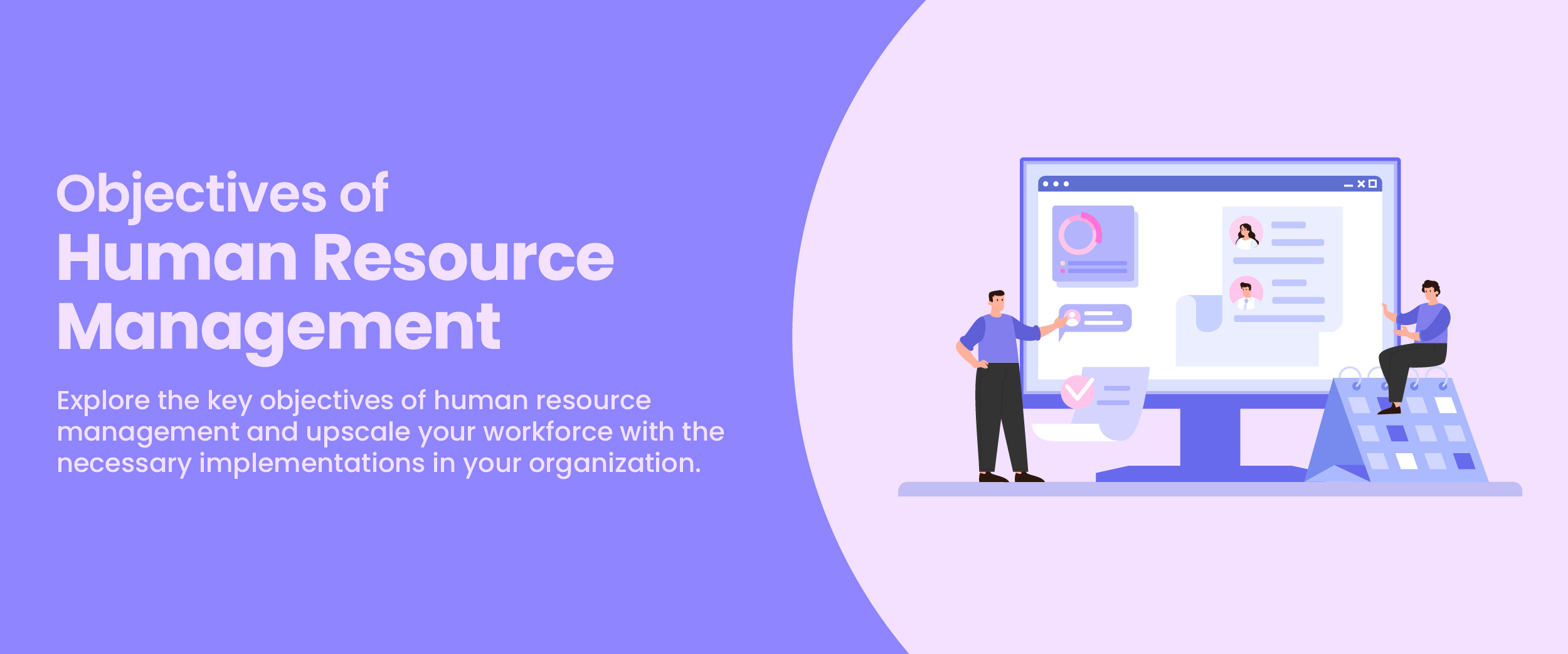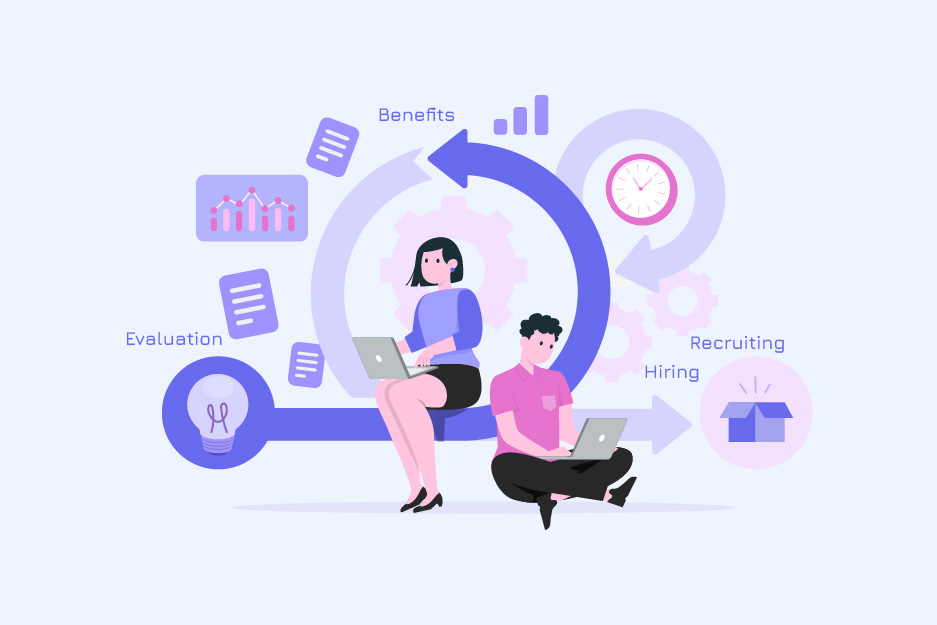Top 10 Objectives of Human Resource Management in 2025
Human resource management is a process that develops, acquires, motivates, and maintains a group of efficient employees. The main objective of human resource management is to ensure everything works out smoothly in an organization. It also ensures that the right people get the right position in the organization. In this blog, we will learn the objectives of human resource management, why they are important, and the role they play in organizations.
What is Human Resource Management?
Human resource management is the strategic approach to effectively and efficiently manage the workforce of an organization. It entails aspects like recruitment and selection of employees, onboarding, training and development, performance management, employee relations, compensation and benefits, labor relations, talent management, employee engagement and retention, and succession planning.
HRM considers employees as human capital or assets of a business and aims to utilize their talent to achieve organizational goals, reduce attrition rate, and maximize return on investment (ROI). If you aspire to work in the HR field, consider pursuing an HR course with placement and kickstart your career in just 4 months.
Why is HRM Important?
In any organization, human resources is the initial block to every step. The right amount of effort helps the employees and company to be on better terms and strive to achieve the mutual goal.
Human resource management keeps the company’s goals and objectives in focus. It is important as it works as a mediator between the company’s processes and its employees.
Human resource management works as a mediator between the company’s processes and its employees. It is responsible for hiring employees by posting a job vacancy, training them, and looking after their growth in the organization by giving them proper appraisals.
Basic Objectives of HRM
The basic objectives of human resource management aim toward effectively handling an organization’s workforce. These include:
1. Employee Motivation
A crucial objective of human resource management is employee motivation. It is essential to ensure that the employees give their best efforts to produce high-quality results for the organization. Some ways this is achieved include giving the employees the freedom to make suggestions and even make decisions, performance-based assessments to provide compensation or rewards, and respecting their perspective.
Some ways this can be achieved include giving the employees the freedom to make suggestions and decisions, performance-based assessments to provide compensation or rewards, and respecting their perspective. Further, regular feedback keeps the employees engaged and productive.
2. Team Integration
HRM aims to achieve seamless integration between different departments and teams with effective communication. This further helps in streamlining various operations and activities of the organization. Effective communication increases efficiency, which enhances productivity. Therefore, HRM aims to find effective tools and integration solutions to facilitate easier communication and collaboration between different teams in an organization.
3. Workforce Empowerment
It is an essential objective of HRM where employees are provided with more control over various tasks. Tools like employee self-service sites are a way to encourage empowerment. Employees can keep a check on leave requests, remaining vacation time, management information, PF accounts, payslip generation, and more with these websites.
4. Retention
Maintaining the retention rate is another basic objective of HRM. It focuses not only on recruiting employees but ensuring they stay for a long time. If employees leave in a short period of time, after the recruitment, selection, and onboarding process, it can be challenging for the organization. Therefore, HR professionals work towards maintaining employee engagement and satisfaction to retain employees for longer terms.


Functional Objectives
The functional objectives of human resource management have everything to do with the company’s functioning. It involves the preparation of organizational policies, put into effect for anyone who joins the company. This helps maintain a structure for the organization to work systematically.
Acquisition objectives are one of the major functional objectives of HRM. Human resource acquisition comprises activities from HR planning to placement of the employees in the organization. The objective is to plan or develop a suitable HR policy and attract, recruit, and retain quality talent from various sources.
Another functional objective is to win employees’ commitment, lower their anxiety levels, and help them understand the company’s expectations through a smooth onboarding process. Furthermore, HRM aims to guide and motivate employees to perform their tasks efficiently.
Organizational Objectives
The organizational objectives work with the organization’s goals. These objectives involve various policies like facilities provided to the employee, a clean and safe environment for working, and technical guidance and support.
HR managers are responsible for assisting the organization in improving the employer-employee relationship. They enable the employees to have the same goal by discussing fair compensation, rewards for good work, and benefits for thinking out of the box.
Societal Objectives
These objectives ensure that the organization meets the psychological, behavioral, economic, social, and ethical needs. They include motivating employees with certain opportunities, like specific benefits programs, community relations programs, disability employment programs, and equal opportunity programs. These opportunities help maintain the employees’ productivity through constant motivation and support and make the company more sustainable and responsible.
Personal Objectives
The personal objectives include acquiring, developing, utilizing, and retaining skilled employees for the effective and efficient performance of the organization. These can be achieved if the employee works for the organization’s benefit along with their individual growth and development.
To attain these objectives, the employee should be provided with generous training and adequate feedback. This will not only improve the company’s performance but will also suggest significant areas of improvement for the employee.
You can learn more about these HRM objectives through this in-depth HR course.
Macro Objectives of HRM
The objectives discussed above constitute most of the work of an organization. However, there are a few additional objectives adopted by human resource management to make the organization flourish and achieve its goals effectively. These include:
1) Accomplishing Goals
The objective of human resource management is to help the organization achieve its goals. These goals may include workforce management and employee requirements like hiring, payroll management, retirement, etc. The HRM assesses the available resources of the organization, determines a purpose, sets targets, and prepares a comprehensive action plan to complete its objectives seamlessly.
2) Work Culture
The work culture plays a significant role in determining human resource management performance. The human resource manager must look into the application of a better working environment.
It includes several things like friendly support from the teammates, approval of leave requests without hassle, and acknowledgment of reimbursement requests. Maintaining a good work culture also involves establishing positive relations with the company’s employees.
3) Training and Development
The objectives of HRM are incomplete without the effective performance of the employees. Hence, training is a necessary step when an employee is hired. Once trained, employees develop a sense of security and responsibility about the duties and tasks they are required to perform. It also increases their productivity and helps them grow personally and professionally.
4) Data and Compliance
Another objective of human resource management is managing the company’s compliance and data. It is important to pay close attention to norms and regulations before making any decision on hiring and payroll. This ensures that the decisions made positively benefit the company and employees. Error-free judgment and avoiding unjust claims can help maintain the reputation and effectiveness of HR and the company.


Importance of HRM
The importance of human resource management in an organization lies in its role of encouraging a positive work culture through various functions. HRM is essential for the training and development of employees. Further, it oversees appraisals and benefits to motivate and retain them and facilitates quality work life. Other reasons why HRM is important are as follows:
- Assists in budget control to create a structured financial compensation plan.
- Closes the gap between human resource supply and demand.
- Establishes corporate reputation.
- Manages profit and productivity.
- Mitigates the risk of a legal lawsuit.
- Creates a better connection between the employee and the organization.
- Reduces and resolves conflicts that may arise due to faulty management, competitor tactics, biases, etc.
Role of HRM in Organizations
The role of human resource management (HRM) in an organization ranges from strategic planning to performing administrative functions. Let us briefly discuss seven essential roles of HRM in organizations:
Strategic Planning
The HR department identifies the human resources needs of the organization, forecasts future demand, and develops recruitment plans accordingly. This strategic planning is aligned with the organization’s mission, vision, and goals.
Recruitment and Selection
This is the primary role of the HRM. The HR division drafts job descriptions, reviews applications, conducts interviews and assessments, and onboards new employees.
Employee Development
With training programs, conferences, and workshops, the HR department promotes skill development in employees, helping them reach their full potential. This leads to enhanced performance and better job satisfaction among employees. This leads to enhanced performance and better job satisfaction.
Employee Relations
HRM handles employee grievances, conflicts, and disciplinary actions. It promotes open communication between the management and employees to create a healthy workplace culture.
Performance Management
HRM is responsible for developing performance appraisal systems to evaluate employees’ performances and provide regular constructive feedback. This helps them maintain the quality of their work and perform according to organizational expectations.
Compliance
HR professionals are responsible for navigating the labor laws and regulations and ensuring the organization’s operations comply with these legal standards. These laws govern aspects, such as health and safety regulations, policies promoting equality and diversity, and employment practices.
Compensation and Benefits
HRM develops competitive salary structures and benefits packages to attract and retain top talent. Additionally, they conduct compensation surveys to identify industry standards and create compensation packages accordingly.
Conclusion
Meeting the objectives of human resource management is crucial for any organization to function well. In other words, an organization is incomplete without human resources. HRM, as a whole, carefully manages all the resources and helps benefit the overall growth and development of the organization. If wish to gain an in-depth understanding of human resources, check out this short-term advanced human resource management course.
FAQs
Human resource management contributes to organizational success by establishing a positive working relationship between the employees and the organization. It hires, trains, and supports new talent to enhance the culture of the organization. It also ensures employees and the organization both find a balance and strive for a mutual goal.
The main objectives of the HRM are ensuring the smooth functioning of the organization, maintaining a positive work culture, training and development, achieving organizational goals, employee motivation, and policy governance.
The HRM main objectives in MBA are maintaining organizational structure, recruitment, and training of employees that contribute towards the strategic goals of the organization. They also include creating a healthy work environment.
The human resource management objectives in education include recruiting skilled and competent teachers to achieve the goal of the educational institution, maintaining ethics and values inside the educational institutions, and increasing the job security of the teachers. They also include ensuring mutual understanding between the teachers and the institution and providing quality training to enhance education standards as per changing policies.







